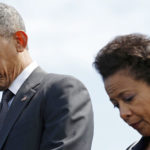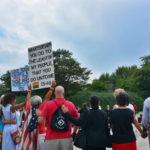WASHINGTON (ABP) — President Bush’s administration and a host of court rulings have indelibly altered the way that the federal government relates to religious charities, according to an analysis by experts on the subject.
“The heart — the core — of the faith-based and community initiative is a commitment to equal treatment of faith-based social-welfare providers,” said George Washington University professor Bob Tuttle at a Dec. 2 briefing in Washington. “Now, eight years into this, it doesn’t seem like such a radical proposition.”
Tuttle and George Washington Law colleague Chip Lupu spoke to reporters at the release of their annual “State of the Law Report” for the Roundtable on Religion and Social Welfare Policy. The non-partisan educational organization — a cooperative effort between the Pew Forum on Religion and Public Life and the Rockefeller Institute of Government — has been tracking Bush’s effort to expand government funding for religious charities.
Tracking cumulative changes
While the report has annually tracked changes in the legal status of government-religious partnerships, this year’s report analyzed the cumulative changes in the status of such partnerships since Bush took office.
Tuttle said Bush’s effort to boost government funding of religious groups has been largely successful. The success owes, he added, mainly to significant changes over the last 10-12 years in how the federal courts view direct government funding for ostensibly secular social services provided by churches and other deeply religious organizations.
“Because of the way that constitutional law developed in the 1970s and 1980s … religious organizations were frequently — not always, but frequently — excluded from government aid programs,” Tuttle said. “But in the 1990s, that began to change.”
A series of decisions began to lower the high wall that the courts had placed between church and state in regard to direct government funding for social services. Before the late 1990s, religious groups wishing to qualify for grants from most federal social-service programs had to incorporate separately from the churches that supported them and operate much as secular social-service agencies would.
Welfare reform expanded funding
Sign up for our weekly edition and get all our headlines in your inbox on Thursdays
The courts gradually altered that equation, and the welfare-reform legislation of the late 1990s further expanded government funding of churches.
However, Tuttle noted, “When the Supreme Court says something’s permitted, there’s a big gap between that permission and something actually happening. And I think when you look at the accomplishments of the faith-based initiative, you have to look at this gap.”
Tuttle and Lupu’s analysis found that, while the courts removed legal barriers to federal funding for religious groups, Bush and his lieutenants also removed many administrative and even cultural barriers that had existed within the executive-branch agencies that administer social-service programs.
“Measured against that standard, the initiative has been, I think, a success that really doesn’t have a parallel in administrative law,” Tuttle said.
Bush has contended that one of the essential aspects of the faith-based initiative is that religious groups should be able to compete for social-services funding on the same basis as secular agencies without having to alter their religious character.
A hiring distinction
Part of that character, Lupu noted, is the unique ability of churches to discriminate on the basis of religion in hiring decisions.
“The Bush administration has fought to preserve this aspect of religious character — the right of faith-based grantees to hire only those of their own faith,” he said. “The administration has fought this with every tool at their disposal.”
Lupu said the administration has done that through a combination of legislation, administrative decree and what he termed a “very aggressive interpretation” of a law guaranteeing strong protections for religious expression in federal settings.
Federal grant programs for social services are administered by multiple federal agencies and authorized by multiple pieces of legislation. Some include explicit provisions preventing grantees from religious and other kinds of employment discrimination. Some include explicit exceptions to those rules for religious grantees. And many programs are simply silent on the subject of employment discrimination.
The employment-discrimination provisions have been among the most controversial aspects of Bush's faith-based effort. Lupu noted that the incoming Obama administration could choose to reverse some of the Bush interpretations of such provisions in a couple of ways. One is re-interpretation of existing statutes; another is executive orders explicitly reversing Bush policies.
Many supporters of strong church-state separation hope he will do so. But Obama has vowed to continue with at least some of Bush’s initiative.
“The fact that Obama said that he was going forward with some version of this on his own and his own life experience as a community organizer suggest that he is quite serious about this,” Lupu said.
While an Obama administration would “be sensitive to church-state issues in some ways that a Bush administration might not,” he noted, Obama would likely proceed cautiously on any major alterations of Bush’s policy with regard to employment discrimination or other provisions of the faith-based initiative.
One reason, he added, is because the employment-discrimination issue is still not a settled one in federal case law.
“I think they’re going to make some of those moves slowly, because it’s going to take several years for [the legal consensus involving them] to ripen,” Lupu said.
— Robert Marus is Acting Managing Editor and Washington Bureau Chief of Associated Baptist Press.














We seek to connect God’s story and God’s people around the world. To learn more about God’s story, click here.
Send comments and feedback to Eric Black, our editor. For comments to be published, please specify “letter to the editor.” Maximum length for publication is 300 words.